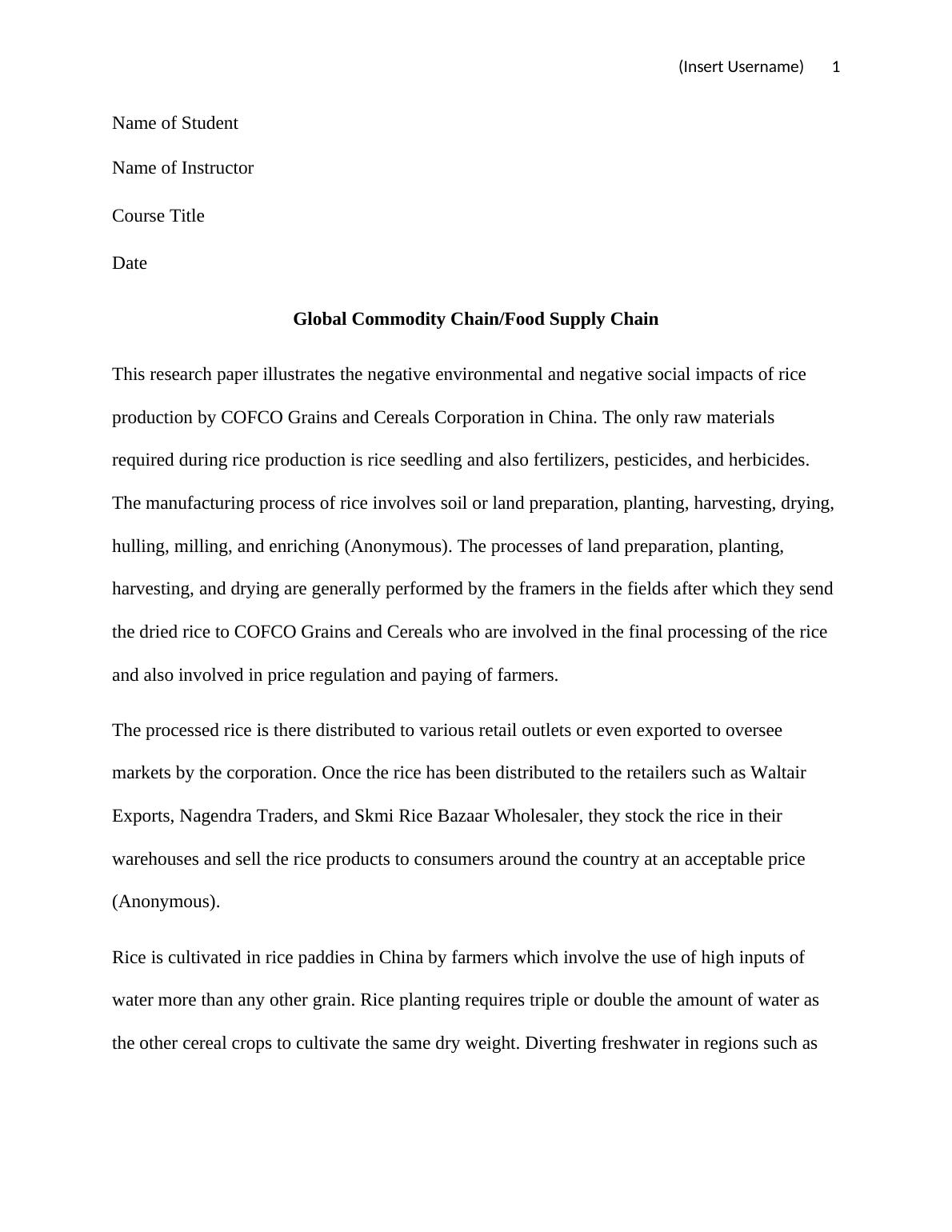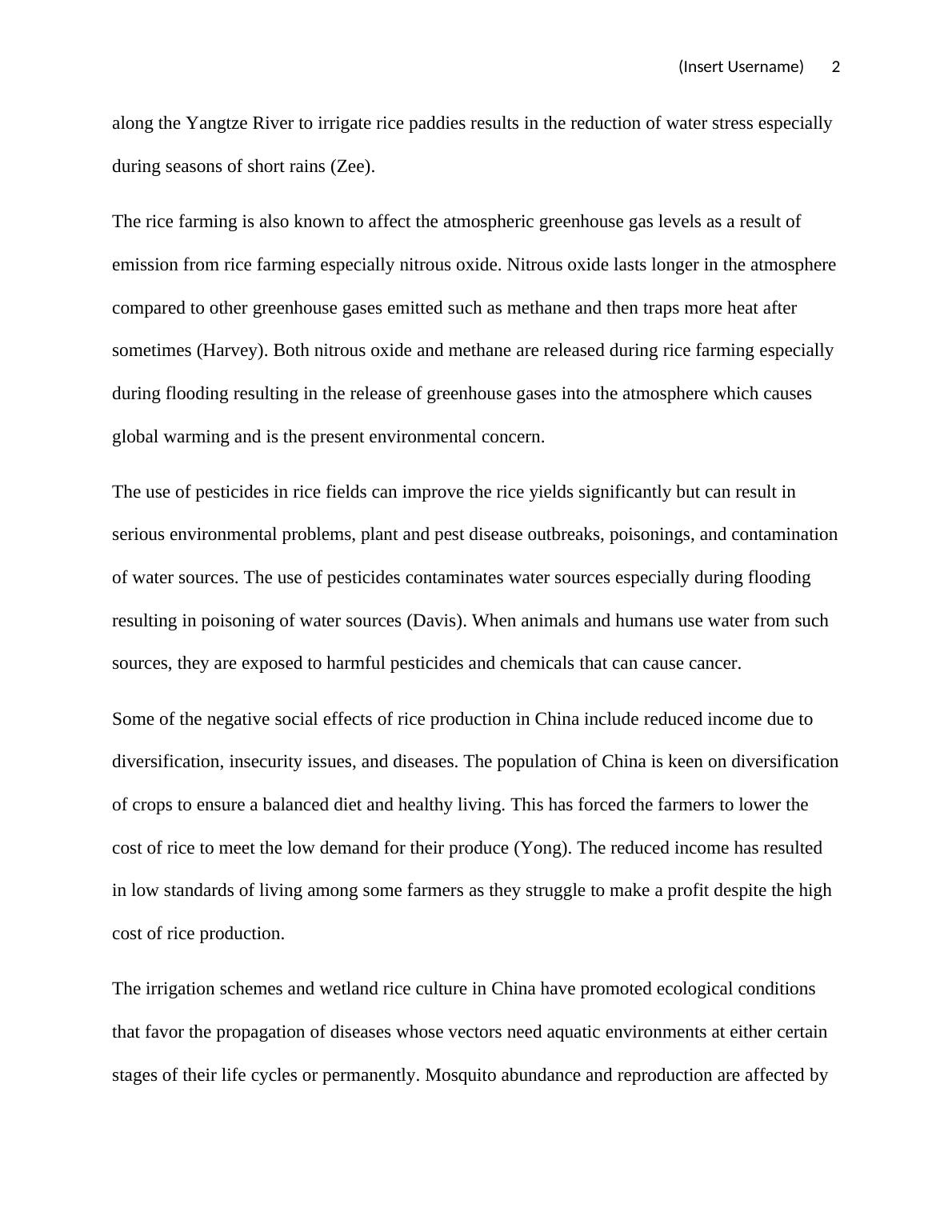Global Commodity Chain/Food Supply Chain Research Paper 2022
Added on 2022-08-28
4 Pages913 Words15 Views
(Insert Username) 1
Name of Student
Name of Instructor
Course Title
Date
Global Commodity Chain/Food Supply Chain
This research paper illustrates the negative environmental and negative social impacts of rice
production by COFCO Grains and Cereals Corporation in China. The only raw materials
required during rice production is rice seedling and also fertilizers, pesticides, and herbicides.
The manufacturing process of rice involves soil or land preparation, planting, harvesting, drying,
hulling, milling, and enriching (Anonymous). The processes of land preparation, planting,
harvesting, and drying are generally performed by the framers in the fields after which they send
the dried rice to COFCO Grains and Cereals who are involved in the final processing of the rice
and also involved in price regulation and paying of farmers.
The processed rice is there distributed to various retail outlets or even exported to oversee
markets by the corporation. Once the rice has been distributed to the retailers such as Waltair
Exports, Nagendra Traders, and Skmi Rice Bazaar Wholesaler, they stock the rice in their
warehouses and sell the rice products to consumers around the country at an acceptable price
(Anonymous).
Rice is cultivated in rice paddies in China by farmers which involve the use of high inputs of
water more than any other grain. Rice planting requires triple or double the amount of water as
the other cereal crops to cultivate the same dry weight. Diverting freshwater in regions such as
Name of Student
Name of Instructor
Course Title
Date
Global Commodity Chain/Food Supply Chain
This research paper illustrates the negative environmental and negative social impacts of rice
production by COFCO Grains and Cereals Corporation in China. The only raw materials
required during rice production is rice seedling and also fertilizers, pesticides, and herbicides.
The manufacturing process of rice involves soil or land preparation, planting, harvesting, drying,
hulling, milling, and enriching (Anonymous). The processes of land preparation, planting,
harvesting, and drying are generally performed by the framers in the fields after which they send
the dried rice to COFCO Grains and Cereals who are involved in the final processing of the rice
and also involved in price regulation and paying of farmers.
The processed rice is there distributed to various retail outlets or even exported to oversee
markets by the corporation. Once the rice has been distributed to the retailers such as Waltair
Exports, Nagendra Traders, and Skmi Rice Bazaar Wholesaler, they stock the rice in their
warehouses and sell the rice products to consumers around the country at an acceptable price
(Anonymous).
Rice is cultivated in rice paddies in China by farmers which involve the use of high inputs of
water more than any other grain. Rice planting requires triple or double the amount of water as
the other cereal crops to cultivate the same dry weight. Diverting freshwater in regions such as

(Insert Username) 2
along the Yangtze River to irrigate rice paddies results in the reduction of water stress especially
during seasons of short rains (Zee).
The rice farming is also known to affect the atmospheric greenhouse gas levels as a result of
emission from rice farming especially nitrous oxide. Nitrous oxide lasts longer in the atmosphere
compared to other greenhouse gases emitted such as methane and then traps more heat after
sometimes (Harvey). Both nitrous oxide and methane are released during rice farming
especially during flooding resulting in the release of greenhouse gases into the atmosphere which
causes global warming and is the present environmental concern.
The use of pesticides in rice fields can improve the rice yields significantly but can result in
serious environmental problems, plant and pest disease outbreaks, poisonings, and contamination
of water sources. The use of pesticides contaminates water sources especially during flooding
resulting in poisoning of water sources (Davis). When animals and humans use water from such
sources, they are exposed to harmful pesticides and chemicals that can cause cancer.
Some of the negative social effects of rice production in China include reduced income due to
diversification, insecurity issues, and diseases. The population of China is keen on diversification
of crops to ensure a balanced diet and healthy living. This has forced the farmers to lower the
cost of rice to meet the low demand for their produce (Yong). The reduced income has resulted
in low standards of living among some farmers as they struggle to make a profit despite the high
cost of rice production.
The irrigation schemes and wetland rice culture in China have promoted ecological conditions
that favor the propagation of diseases whose vectors need aquatic environments at either certain
stages of their life cycles or permanently. Mosquito abundance and reproduction are affected by
along the Yangtze River to irrigate rice paddies results in the reduction of water stress especially
during seasons of short rains (Zee).
The rice farming is also known to affect the atmospheric greenhouse gas levels as a result of
emission from rice farming especially nitrous oxide. Nitrous oxide lasts longer in the atmosphere
compared to other greenhouse gases emitted such as methane and then traps more heat after
sometimes (Harvey). Both nitrous oxide and methane are released during rice farming
especially during flooding resulting in the release of greenhouse gases into the atmosphere which
causes global warming and is the present environmental concern.
The use of pesticides in rice fields can improve the rice yields significantly but can result in
serious environmental problems, plant and pest disease outbreaks, poisonings, and contamination
of water sources. The use of pesticides contaminates water sources especially during flooding
resulting in poisoning of water sources (Davis). When animals and humans use water from such
sources, they are exposed to harmful pesticides and chemicals that can cause cancer.
Some of the negative social effects of rice production in China include reduced income due to
diversification, insecurity issues, and diseases. The population of China is keen on diversification
of crops to ensure a balanced diet and healthy living. This has forced the farmers to lower the
cost of rice to meet the low demand for their produce (Yong). The reduced income has resulted
in low standards of living among some farmers as they struggle to make a profit despite the high
cost of rice production.
The irrigation schemes and wetland rice culture in China have promoted ecological conditions
that favor the propagation of diseases whose vectors need aquatic environments at either certain
stages of their life cycles or permanently. Mosquito abundance and reproduction are affected by

End of preview
Want to access all the pages? Upload your documents or become a member.